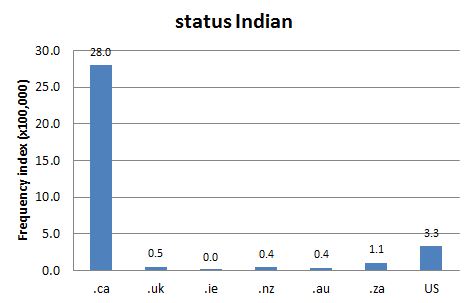DCHP-2
status DCHP-2 (October 2016)
1 adj. — Aboriginal (First Nations)
a First Nations person recognized as such under the Indian Act; often used in compounds, as in status Indian or status woman.
Type: 4. Culturally Significant — The term status is part of Canada's legal heritage. Those with status are defined as "individual[s] recognized by the federal government as being registered under the Indian Act" (see AANDC reference) and thus entitled to a variety of federal and provincial governmental services (see the 2003 quotation). Aboriginal peoples who hold this legal title are given a status card, or Certificate of Indian Status (see the 2008 quotation), which states "information about their identity, their band and their registration number" (see Indigenous Foundations reference). Rules of eligibility for status have changed over time (see ANNDC reference) and are outlined in Section 6 of the Indian Act (see Indigenous Foundations reference). Note that although status is a concept established by the Canadian government and forced onto Aboriginal people in an attempt at colonial assimilation, it is now considered by many as an affirmation of their Aboriginal identity and ancestry, as well a legal acknowledgement of federal obligations to Aboriginal peoples (see Indigenous Foundations reference).
Before 1985 (see Bill C-31), examples of ways one could lose status and become enfranchised (that is, entitled to the vote and other rights of citizenship) included serving in the Canadian armed forces, obtaining a university degree or marrying a non-status man; if a First Nations woman married a man without Indian status, she would automatically lose her status (see non-status). However, if a First Nations man married a woman without Indian status, he would be permitted to keep his status (see the 2013 quotation). Addressing some of the discriminatory facets of the Indian Act, amendments were made in the form of Bill C-31 to reinstate the status of First Nations women who had lost it due to marriage (see Canadian Encyclopedia reference). However, the status they regained did not mean the same as status that others had before. Internet domain searches indicate that the term is most prevalent in Canada (see Chart 1).
See also COD-2, s.v. "status"(4), which is marked "Cdn", and AHD-5, s.v. "status Indian", which is marked "Canadian".See also: enfranchised Indian (meaning 1b) Indian Act Indian Register registered Indian reserve treaty Indian non-status assimilation Bill C-31
- The term status Indian is a legal term in Canada, going back to the Indian Act. While semantic change is underway, replacing Indian with more contemporary terms such as First Nation or Aboriginal person, the term Indian and some of its compounds will remain in use as long as the Indian Act is the name of the regulation. Clippings such as status (n.) often avoid problematic terminology.
2 adj. — predicative, Aboriginal (First Nations)
See meaning 1.
Type: 4. Culturally Significant — Increasingly used as an adjective in predicative position.References:
- AANDC "Indian Status" Accessed 20 May 2014
- AHD-5
- COD-2
- Canadian Encyclopedia s.v. "Indian Act" Accessed 31 May 2016
- Indigenous Foundations "Indian Status" Accessed 20 May 2014
Images:
Chart 1: Internet Domain Search, 16 Oct. 2012
